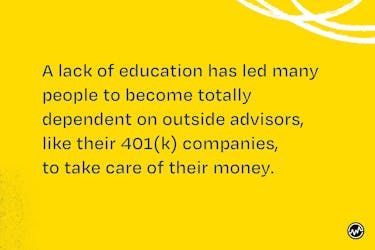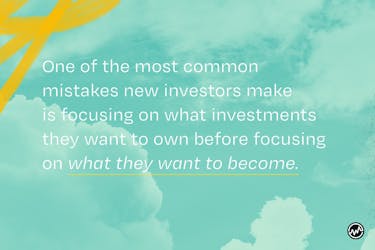

Get Access to 250+ Online Classes
Learn directly from the world’s top investors & entrepreneurs.
Get Started NowIn This Article
You've decided you want to be an investor. Now what? Do you buy a handful of stocks and hope for the best? You can — but you shouldn't. To be a great investor, you'll need something more powerful than luck on your side: knowledge. In order to gain that knowledge and become an investor, you need an education.
In this article, we’re going to discuss how to become an investor, including:
- The biggest financial risk is a lack of education
- Why a 401k may not be your best investment opportunity
- How to make investing a life skill
- Additional investing resources to boost your financial IQ
Let’s get started with an all too common story.

Imagine you are placed in the middle of the woods with another person you have never met before. You are told that it takes one day on foot to get back home. You are given:
- map
- compass
- enough food and water for one day
Your companion has the same resources.
The map shows where you are, and where your home is. But you have never used a compass before and you’re not sure how it works.
The other person claims to know how to use the compass and offers to guide you to safety. So you take the person’s advice, because you think that it’s the only choice available to you.
See the parallel?
Your survival depends on your companion — and whether you’re stuck in the woods or investing your hard earned money, this can be unnerving and dangerous.
Lack of Knowledge Forces You to Depend on Someone Else
When we can’t do something for ourselves, we are forced to rely on others. And when we rely on others, we surrender all of our control to them.
Do they really know how to use a compass and read maps?
Do we trust them to lead us safely out of the woods?
Most importantly, are they most interested in helping us, or themselves?

A lack of education has led many people to become totally dependent on outside advisors, like their 401(k) companies, to take care of their money.
They depend on these unknown advisors to make their dreams come true.
Perhaps we are so trusting of these faceless financial advisors because of the lore surrounding them.
We are led to believe that they possess almost magical predictive powers.
Even more, we are made to feel that these special powers are beyond the reach of ordinary mortals like you and me.
We assume we can’t learn these skills for ourselves, that we can’t do the “magic” that they do, so we quietly kneel before the 401(k) companies and lay our futures at their altars, completely at their mercy.
Learn How to Become an Investor

One of the most common mistakes new investors make is focusing on what investments they want to own before focusing on what they want to become.
A person with no knowledge or understanding of investments can invest. But to truly take control of your financial future, you need to know exactly what you're doing.
You need to gain the skills of an investor in order to achieve the results you desire.
As you grow your knowledge of investing, you will learn investing techniques people use in the stock market to achieve monthly cash flow and retire early.
You will not only realize what can be done, but that you can do it. You can:
- become a competent investor
- become a successful investor
- invest intelligently for your own success
The ultimate goal here is proficiency — knowing which steps to take to get to your desired results.
Those who are proficient have become investors, while those who fall short of proficiency merely have investments and must depend on others.
The Ultimate Irony & Why You Should Become An Investor

The mutual fund and 401(k) culture promotes the idea that only the “experts” on Wall Street have the skills to invest safely and profitably.
Warren Buffett disagrees. He says:
The ultimate irony of the investment business is that there is no question that an obstetrician can deliver babies better than the husband or wife. If you take dentists as a whole they will pull teeth or fill teeth better than if the patient does it themselves. But in the investment world someone who believes in American business and is consistent will get results that exceed professionals as a group.
Incredible words, right?
Having someone else manage our investments robs us of:
- experience
- satisfaction
- financial rewards of becoming serious investors ourselves
If we don’t care about our money and don’t care about increasing wealth for the future, then it’s fine to hand it off to someone else.
Having Money Is Like Having Children...
Your children are yours, and you are responsible for them.
If you pass off the entire responsibility of raising your children to others, you rob yourself of finding out just what kind of mother or father you could have become.
Will your children be taught what is important to you?
Will they have the values and morals you want to pass on to them?
You have no idea, because you have given up control of their upbringing.
Obviously, there’s nothing wrong with using services like daycare to help out. We all need some help along the way.
Ultimately, though, you are the parent.
Moreover, even the best day care folks do not have the same feelings for my kids that you do. The same is true with your money.

No one cares about your money like you do.
When we have money, it is our responsibility to spend it wisely and invest it with intelligence. As with raising children, it can be valuable to have an advisor help us along the way.
But even with the help of an advisor, we are each responsible for what happens to our money.
Get Out of the 401(k) Fire Now
No one else will care for your money like you will, but 401(k)s and mutual funds encourage a very hands-OFF approach: they are mostly out of sight and out of mind.
Sometimes our only reminder they exist is the quarterly statement we get in the mail or emailed to us.
Even then, we rarely use that information to take any kind of action.
The statement may deliver good news or horrible news, but in either case, most don’t do anything to change their strategy.
This mindless faith in the long-term performance of the stock market is spun and twisted with phrases such as:
- “being patient”
- “being consistent”
- “not panicking”
- “staying the course”
These words sound good and feel good when we hear them, but the sense of safety they give us is based on false premises and false promises.
If you were standing inside of a burning building with blazing beams and rubble falling all around you, what would you do?
Would you be willing to remain patient, be consistent, avoid panicking, and stay the course?
Would you wait to be magically transported to safety and fresh air?
Of course not!
When you see danger, you do everything you can to stay alive. You run away from the burning building and you don’t look back.
Waiting around and hoping the fire will extinguish itself isn't smart or prudent — it's foolish.
Shrugging your shoulders at your horrible 401(k) statements is a lot like sitting in your burning living room playing cards and saying, "Gee, I hope this situation improves in a little while."
Get out of the 401k fire by becoming an investor and making it a live skill.
Make Investing A Life Skill

The human brain is incredible. We can be more than worker bees. We have amazing brains that can learn new things and acquire new skills. We have the capacity to pick up valuable information and store it.
We develop incredible talents through practice and perseverance.
Take the example of a young man I know who has become quite an accomplished pianist. From age 8 to 18, he spent 30 minutes each day learning to play the piano and $20 each week on piano lessons.
A half hour a day may not sound like much time, but think about it. When you add that time up, it becomes almost 2,000 hours spent on the piano bench.
And that $20 a week? That’s nearly $10,000 invested in his musical education.
He wasn’t born with the ability to play piano, but with a committed investment of time and money he became proficient.
Guess what? You can do the same thing as an investor. You just have to learn how to become an investor.
If generating money through investments is important to you, then:
- invest in your learning
- learn about investing
Just as people take lessons to learn how to play a musical instrument, prepare a gourmet dish, or drive a motorcycle, you can dedicate time and money to financial knowledge.
Acquiring these financial skills will open doors to freedom, time, and great satisfaction. Plus, it can be one of the ways to achieve wealth, which here at WealthFit we define as the abundance of time, money and resources.
Then, you can put yourself in the driver's seat and take control of your money.
After all, no one cares about your money as much as you do.
Continued Learning: How To Become An Investor
Learning how to become an investor and obtaining a financial education is easy — if you know where to start.
Here at WealthFit, that’s exactly what we specialize in: helping everyday people begin the financial education process so they can achieve their financial goals.
If you’d like to learn more, here are a few free resources to get you started:
- Discover how to read in a stock in just 60 seconds
- These are the 5 most consistent stocks in the last 50 years
- Choose from one of these stock market investing strategies
- Find out how to balance your portfolio using businesses, commodities, paper assets and real estate
- Improve your child’s financial education with this Beginner’s Guide for investing for teens
- Here is a beginner’s guide to part time or full time real estate investing
- Master your personal finances with one (or all!) of these 13 courses






